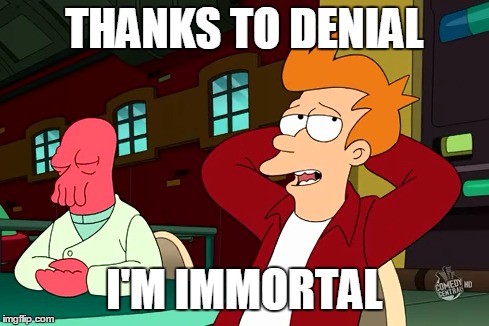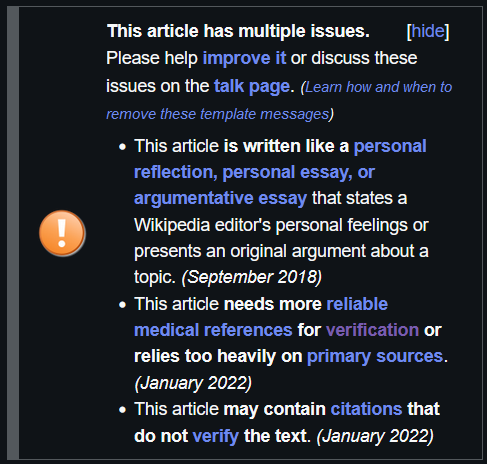
Creepy Wikipedia
A fediverse community for curating Wikipedia articles that are oddly fascinating, eerily unsettling, or make you shiver with fear and disgust

Guidelines:
-
Follow the Code of Conduct
-
Do NOT report posts YOU don't consider creepy
-
Strictly Wikipedia submissions only
-
Please follow the post naming convention: Wikipedia Article Title - Short Synopsis
-
Tick the NSFW box for submissions with inappropriate thumbnails.
-
Please refrain from any offensive language/profanities in the posts titles, unless necessary (e.g. it's in the original article's title).
Mandatory:
If you didn't find an article "creepy," you must announce it in the thread so everyone will know that you didn't find it creepy

The first two claims are not really supportable:
Human beings are the only living things that are truly aware of their own mortality and spend time pondering the meaning of life and death.[24] Awareness of human mortality arose some 150,000 years ago.[25]
The claim that only humans are aware of mortality is from an article about COVID and death anxiety by 3 psychologists, no primatologists, paleontologist or animal behavior specialist. Recently published elephant burials and long documented chimp and corvid mourning behavior could undermine this claim. Although an emotional reaction to death may not imply awareness of one's own death.
The second claim that mortality awareness is only 150,000 years old is sourced to a 25 year old psychology paper. Our understanding of the human past has radically transformed since then. Sima de los Huesos may show mortuary practice from 400,000+ years ago, Dinaledi chamber may show non-sapiens mortuary practice from 200,000+. And if erectus (2M - 100k y/a) had fire, boats and language or proto-language well mortality awareness doesn't seem out of the question.
There's no good reason to think we know when awareness of death arose.
yeah

I think animals have a better grasp on death than we do.
I bought my first dog at 5 years old. He came with neuropathy in his hind legs that slowly progressed. I'd have to counterbalance him when he pooed so he wouldn't sink down into it. He had to wear shoes so he wouldn't wear his nails down to bleeding stumps. He was prescribed meds, but they only helped him with any pain.
One November it snowed early, and on our walk he went down twice. The second time I almost wasn't able to get him up. I returned home, sobbing, and I told him that I didn't know what to do. That if he stopped eating, I'd know it was time. (He was always a big eater.)
I brought him his breakfast, and he just looked at me like, "we had a deal," and refused to eat.
I had to pick him up out of the car, and we petted him until he passed. I still feel guilty as if I should have been able to do more. But I'll never forget the look in his eyes. He knew it was time, and he accepted it. His only concern was trying to help me be okay.
Intelligence might be largely a human thing. But we have a lot to learn about wisdom.
This was a very touching comment. Thanks for sharing.
I don’t know if you still want help or if this will work, but I’m always calmed by the inevitability of death. It’s the one thing that’s definitely supposed to happen.
It’s not the fact that it’s going to happen that troubles me, but the how.
Car accident? Fall down the stairs and snap my neck? Some guys break into my house and rape me before slitting my throat? Sleep apnea doesn’t end in me suddenly waking?
There are millions of possibilities. And then, my brain has to grapple with the lack of existence. How does kaitco simply stop existing? I spent some 13 billion years not existing and then I’m here, but then I’m not?
Anywhoozle…I’m gonna go play video games for a couple hours.
It doesn't help that I can't remember being born
that is not calming to me at all
Sorry. Do you know any really old, happy people well enough to talk to them about death? In my experience they’ve got a perspective that’s reassuring, but it does go in the same direction: you get to finally rest, etc.
I have my 84 year old grandparents, one of which has cancer, both are terrified, and the only positive notion is "At least I don't have to suffer any more."
Well damn, maybe I just come from a zen line. I’m sorry they’re afraid.
Elephants know this as well. As do many pack animals.
Another single basic mechanism (for some in the world, anyway) is: acceptance.
Not saying you have to like death. But it's all around us, and people who live closer to nature get to see death regularly, from carnivorous animals (little choice) to plants which green, bear fruit, and fade away in fall. Most people don't ever need to embrace death, but recognize it's part of the natural order.
Denial points us away from the real and is mentally unhealthy. Acceptance releases us from that potential fear and stress. It also encourages us to truly appreciate what we have, especially while we have it, and ever afterward for our good fortune while we had it. Life is change.
Acceptance reminds us to 'drink life to the lees', like Omar Khayyam. Not to waste our time on adverts, or fashion trends, or fretting about things we can't do anything about, or worrying about what might be. When we're sure we've done our best in this wiggy world, we need ask ourselves no more. Compassion for ourselves empowers us to share that with others.
But what does a river in Egypt have to do with it?
bullshit.
scientists are sure elefants know about their own mortality.
why is english wikipedia so dumb?
